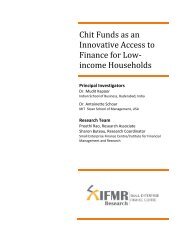Government of India Volume I: Analysis and Recommendations
Government of India Volume I: Analysis and Recommendations
Government of India Volume I: Analysis and Recommendations
Create successful ePaper yourself
Turn your PDF publications into a flip-book with our unique Google optimized e-Paper software.
INTRODUCTION<br />
The Commission has understood that the world has learnt the lessons <strong>of</strong> financial instability<br />
<strong>and</strong> therefore provided for an effective <strong>and</strong> continuous mechanism for addressing<br />
issues <strong>of</strong> systemic risk, as well as, the need for addressing failures <strong>of</strong> individual entities<br />
through resolution. The messages coming clear <strong>and</strong> loud from the financial crisis on the<br />
need for more closely <strong>and</strong> effectively regulating the market, emphasis on systemic risk,<br />
<strong>and</strong> an effective resolution framework have been factored into the recommendations <strong>of</strong><br />
the Commission.<br />
1.5.5. Regulatory developments elsewhere<br />
Following the financial crisis <strong>of</strong> 2008, there have been several efforts in some jurisdictions<br />
for strengthening, <strong>and</strong> in a few cases, recasting regulatory structures. These are<br />
particularly pronounced in the case <strong>of</strong> the US <strong>and</strong> the UK, while other jurisdictions are<br />
contemplating limited changes in strengthening the weaker links in their structures. The<br />
Commission had extensive interaction with the <strong>of</strong>ficials <strong>and</strong> experts on the changes being<br />
made in the UK, Canada, Australia, Singapore <strong>and</strong> limited dialogue with agencies such as<br />
the US Fed <strong>and</strong> Indo-US Business Council. The most radical changes are being contemplated<br />
in the UK, where the super regulator, Financial Services Authority (FSA), has been<br />
divided <strong>and</strong> the m<strong>and</strong>ate relating to prudential regulation transferred to the Bank <strong>of</strong> Engl<strong>and</strong><br />
as its subsidiary <strong>and</strong> converting the FSA into a Financial Conduct Authority (FCA). Our<br />
underst<strong>and</strong>ing <strong>of</strong> the reasons for this change was that FSA’s focus on the market conduct<br />
dimensions at the cost <strong>of</strong> relative neglect <strong>of</strong> the prudential dimension led to building up<br />
<strong>of</strong> risks for the banking sector, which was not observed in time. In the case <strong>of</strong> Australia, on<br />
the other h<strong>and</strong>, prudential regulation <strong>and</strong> conduct regulation had been divided <strong>and</strong> m<strong>and</strong>ated<br />
to two distinct agencies (Australian Prudential Regulatory Authority <strong>and</strong> the Australian<br />
Securities Investment Commission) in their twin-peak model which was adopted<br />
in the mid 90’s. This model withstood the crisis relatively better. Similarly, in Canada, prudential<br />
regulation <strong>and</strong> conduct regulation has been placed in two different agencies, the<br />
Office <strong>of</strong> the Superintendent <strong>of</strong> Financial Institutions as well as the Financial Consumer<br />
Agency. While the importance <strong>of</strong> treating prudential <strong>and</strong> conduct regulation distinctly in<br />
these jurisdictions has been well understood, the Commission has not recommended a<br />
similar approach in the <strong>India</strong>n context because <strong>of</strong> the reason that the required regulatory<br />
expertise is not yet available. Hence, the recommendation for the same regulator dealing<br />
with both prudential <strong>and</strong> market conduct aspects for the medium run, while in the<br />
long run this could be modified depending on the experiences gained within this country<br />
<strong>and</strong> elsewhere. The legal <strong>and</strong> statutory framework also tries to provide for easy changes<br />
in regulatory m<strong>and</strong>ate so that changes in functions would involve only limited statutory<br />
changes.<br />
1.5.6. Global co-ordination in the emerging context<br />
Along with financial globalisation, complexities <strong>of</strong> financial regulation have also increased.<br />
This became more complex after the crisis <strong>and</strong> following the adoption <strong>of</strong> greater scrutiny<br />
<strong>of</strong> the concerns arising from terrorism-related financial activities. The new obligations<br />
under the Financial Action Task Force (FATF) <strong>and</strong> Combating the Financing <strong>of</strong> Terrorism<br />
(CFT) regimes have necessitated co-ordination between domestic financial regulators<br />
amongst all the jurisdictions <strong>and</strong> between the global co-ordinating institutions. Greater<br />
co-ordination has also become imperative in the context <strong>of</strong> concerns on financial stability.<br />
The Commission is fully aware <strong>of</strong> the onus that these additional tasks would bring<br />
upon domestic regulatory authorities as well as the enabling legal framework.<br />
1.5.7. Harmonisation <strong>of</strong> laws<br />
All the factors outlined in the previous sub-sections necessitate the need to redraft our<br />
legislations <strong>and</strong> harmonise them. Our laws have been built up over a century <strong>and</strong> have<br />
8 FINANCIAL SECTOR LEGISLATIVE REFORMS COMMISSION



